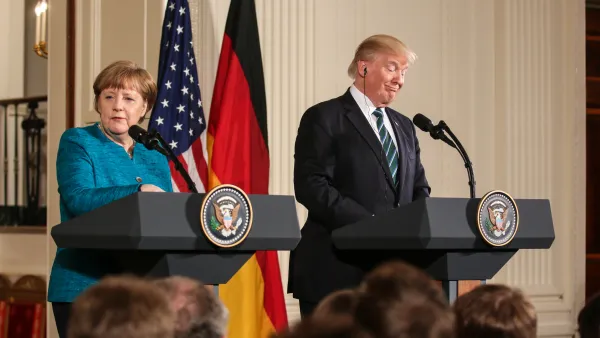German Chancellor Angela Merkel is trying to salvage a plan to increase the country's reliance on renewable energy to at least 35 percent by 2020 amid rising energy prices and mounting criticism
Melissa Eddy reports on Merkel's efforts to develop a nationwide strategy on renewable energy in order to salvage what was once a widely supported plan for energy transformation passed last year in the wake of the Fukushima nuclear disaster in Japan.
"Until now," writes Eddy, "each state has drawn up and worked from its own plan for the
expansion of renewable resources in its territory, often in conflict
with one another. On the federal side, there is no single leader for the
project to increase reliance on renewable energy to at least 35 percent
by 2020. Instead, responsibilities are divided between the ministries
of the environment and the economy, with the education minister
responsible for financing research on renewable energy and storage
technology."
"The opposition Social Democratic Party has pounced on the weakness in
the Merkel government's signature project ahead of national elections
next year, while widespread public support for the plan faces strains
from a nearly 50 percent jump in a consumer tax for the transformation
next year."
Meanwhile, according to Stanley Reed, Europe in general, and Germany in particular, are seeing a contradictory rise in the use of coal and the construction of coal-fired power plants.
"A kind of economic chain reaction is making coal attractive in Europe," writes Reed.
"U.S. utilities are shutting down their coal-fired plants and switching
to
because the shale gas revolution has made the cleaner-burning fuel
cheaper. U.S. coal producers are then exporting their product to Europe,
helping to lower prices there."
"Utilities will soon need to pay a carbon price for coal, but at the
moment that price in the European program for carbon trading - about €8
per ton of carbon emissions - is far too low to affect their decisions."
"What is going on is a shift from nuclear power to coal and from gas to coal; this is the worst thing you could do, from a perspective," said Dieter Helm, a professor of energy policy at the University of Oxford.
FULL STORY: Germany Discusses National Energy Plan

Analysis: Cybertruck Fatality Rate Far Exceeds That of Ford Pinto
The Tesla Cybertruck was recalled seven times last year.

National Parks Layoffs Will Cause Communities to Lose Billions
Thousands of essential park workers were laid off this week, just before the busy spring break season.

Retro-silient?: America’s First “Eco-burb,” The Woodlands Turns 50
A master-planned community north of Houston offers lessons on green infrastructure and resilient design, but falls short of its founder’s lofty affordability and walkability goals.

Test News Post 1
This is a summary

Analysis: Cybertruck Fatality Rate Far Exceeds That of Ford Pinto
The Tesla Cybertruck was recalled seven times last year.

Test News Headline 46
Test for the image on the front page.
Urban Design for Planners 1: Software Tools
This six-course series explores essential urban design concepts using open source software and equips planners with the tools they need to participate fully in the urban design process.
Planning for Universal Design
Learn the tools for implementing Universal Design in planning regulations.
EMC Planning Group, Inc.
Planetizen
Planetizen
Mpact (formerly Rail~Volution)
Great Falls Development Authority, Inc.
HUDs Office of Policy Development and Research
NYU Wagner Graduate School of Public Service




























